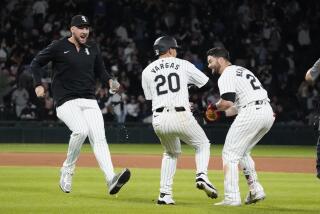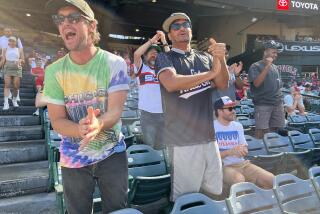Angels Turn Game 2 Into the Fenway Follies : California’s Blunders Help Boston Win, 9-2, and Even Playoffs, 1-1
- Share via
BOSTON — This town reeks of history, and in the broad daylight of an October afternoon, the Angels saw fit to trot out some of their own heritage.
Considering how much pitching and defense and playoff experience they have stockpiled, games like Wednesday’s 9-2 Boston bombing should never happen to the Angels. But they do, they do.
Game 2 of the American League Championship Series was a montage of every Angel nightmare, disaster, faux pas and pratfall that they ever conceived--all rolled into nine untidy innings. Sort of a greatest flubs package.
Remember Game 5 of the 1982 playoffs? Remember the 5-0 lead in Cleveland in late 1985? Remember Rick Burleson dropping a pop fly and Todd Fischer’s balk in the 12th inning this July at Fenway? Then multiply by about four or five.
That comes close--not quite there, but close--to describing how the Angels watched their imposing 1-0 advantage over the Red Sox painstakingly melt into a 1-1 split in the first two games of this best-of-seven series.
“Our worst game of the year,” Brian Downing said.
“I can’t ever remember seeing so many strange plays or so much miscommunication among our infielders,” said Burleson, who roosted at Fenway Park for seven years.
Manager Gene Mauch said: “It’s no use for me to discuss what happened out there because I don’t understand any of it.”
Understand it? For Mauch, it was difficult enough to watch.
How ugly did it get for the Angels? Follow along, if your stomach is strong:
--Kirk McCaskill, the Angels’ young 17-game winner, opened his first playoff appearance by nearly getting blasted all the way back to Vermont. The first inning was Bunker Hill revisited. Six Red Sox hitters, six rockets.
Wade Boggs tripled off the top of the Green Monster. Marty Barrett doubled into the right-field corner. Bill Buckner scalded an out to center field. Jim Rice hit a grounder so hard that before Barrett could react, he was tagged out, almost by reflex, by shortstop Dick Schofield.
Don Baylor then hit one of the world’s longest singles, a line drive all the way to the base of the scoreboard in left. Dwight Evans drilled another out to center field.
Amazingly, McCaskill escaped with only one Boston run and a few powder burns. Welcome to the postseason, Kirk.
His first thought: “Man, I better settle down. I’m not gonna be around long.”
--McCaskill stuck around for the second inning but probably wished he hadn’t. Rich Gedman opened with a line-drive single. After Tony Armas struck out, Spike Owen chopped the ball into the infield seam where grass meets dirt, sending the ball kangarooing over Schofield’s head. Boggs hit another chopper to the left of the mound--a grounder that McCaskill lost in the sun.
Bases loaded. Barrett singled in one run, but McCaskill was saved by a double play. Things, however, would get worse.
--Wally Joyner, who would break a two-month home run drought with a drive over the right-field fence in the fifth inning, the first homer by a rookie in playoff history, was denied an earlier one on a gate-crashing catch by Evans in the right-field corner in the third inning.
--The Angels put their first two runners on base in the fourth inning, and Mauch, Mr. Little Ball, suddenly played for the three-run homer. He disdained the bunt and had George Hendrick swing away. Hendrick popped out to Boggs. Bobby Grich then reached first on Boggs’ error to load the bases.
The Angels followed it up with an infield single by Schofield and two fly-outs by Bob Boone and Gary Pettis, collecting a meager run on three hits.
--Evans lofted a pop fly over second base with two runners on in the fifth inning. Schofield gave chase. Second baseman Bobby Grich gave chase. Grich looked at Schofield. Schofield told Grich to take it. Grich reached up at the last instant, but his glove only grazed the ball. Buckner scored from second base.
--Grich made amends in the sixth by singling to left and moving to second on a single by Schofield. Boone also singled, lining the ball to left.
Grich headed for third base, looking for a signal from coach Moose Stubing. Stubing made no gesture. Grich kept running.
Rice, the left fielder, made a powerful throw, which Boggs, the third baseman, alertly cut off near the mound. Grich was hung up and could only scramble back to third, where Owen was waiting for him with the tag.
That play summarized the Angels’ frustration of the day, with Grich spiking his batting helmet and screaming at Stubing as he ran off the field.
“It was my fault, I blew it,” said Stubing, who explained his lack of action as an attempt to decoy Rice. “I never put my hands up because I didn’t want Rice to know what we were doing. I tried to stop Bobby verbally. Bobby heard me, but by then, it was too late.”
Said Grich: “I gotta see some kind of hand sign. As a runner, I’m going as aggressively as I can. I’m thinking I can score unless I’m held up.
“But I didn’t see anything. I heard Moose saying, ‘Hold it! Hold it!’ and tried to stop. But I had so much momentum that I lost my footing. I looked up, and Boggs had the ball.”
The Angels went on to score no runs on three hits.
--In the seventh, the Angel defense responded by tying a playoff record with three errors in one inning.
Grich scooped up a grounder by Buckner and dropped the ball when he tried to extract it from his glove. Error No. 1.
With the bases loaded, Evans hit a sharp grounder to third. The ball popped out of Doug DeCinces’ glove. DeCinces retrieved it and tried to make a diving tag on Rice, who was moving from second to third. DeCinces missed. Error No. 2.
Rich Gedman grounded into what should have been an inning-ending double play. But when Schofield made the pivot at second base, his throw deflected off the hands of the sliding Evans and landed nowhere near first base. Two runs scored. Error No. 3.
Bruce Hurst, the Boston starting pitcher, didn’t require all this assistance, but he gladly accepted it. Hurst, who went 5-0 in September and was named American League pitcher of the month, gave up 11 hits in 9 innings but restricted the Angels to one earned run. Hurst struck out four and did not walk a hitter.
Suddenly, the Red Sox--down after having their ace, Roger Clemens, kicked in Game 1--were revitalized.
“We were the home team and we were looking for a split,” Baylor said. “It would have been tough going out there (to Anaheim) having to win all three of them. I thought about it all day.”
Said Boston Manager John McNamara: “This picks us up. It puts us back even. We’ve met the challenge all year and we did it again today.”
McNamara was diplomatic when asked about the Angels’ breakdown.
“It is a game played by human beings,” he said. “Errors are going to be made. No one is infallible.”
Wednesday, the Angels were very human, very fallible.
“You’re not gonna forget about a game like this,” Downing said. “We were lousy. It was a very unusual game, but we did it. We can’t blame it one anyone or anything.
“You just can’t keep giving extra baserunners. You can’t let them keep rolling their lineup over and over. Sooner or later, you pay the price.”
Burleson, who knows what havoc Fenway can wreak, tried to explain the unexplainable--what in the world happened to the Angels.
“This can happen to a team not used to playing here,” Burleson said. “They can play three or four times and run into one game like this.
“The wind gets to blowing, and it’s a bright day in the sun. You also have the wall, which usually hurts the opposing team. For a visiting team at Fenway, this is typical.”
Well, that might be stretching the point a bit.
“I’m not presumptuous enough to discuss things I don’t understand,” Mauch said. “And I don’t understand bad hops over the shortstop’s head or balls in the sun or pop flies that no one can see. I don’t know how to discuss it.”
Much later, after Mauch was dressed in street clothes and waiting for the team bus that would begin the Angels’ trek home, the manager talked with a reporter.
“If you see McNamara, tell him that if there’s anything else I can do for him, let me know,” Mauch said.
Mauch’s Angels, the team that never does anything easily, had done it again.
More to Read
Go beyond the scoreboard
Get the latest on L.A.'s teams in the daily Sports Report newsletter.
You may occasionally receive promotional content from the Los Angeles Times.






